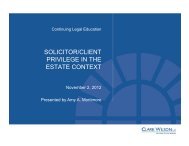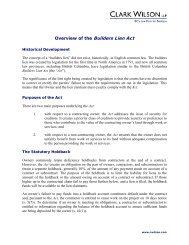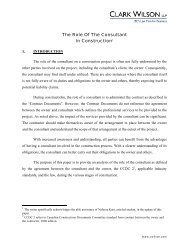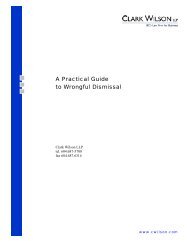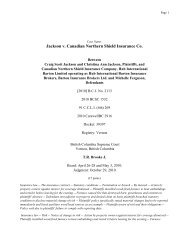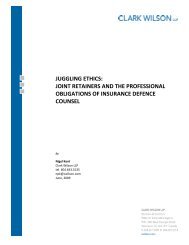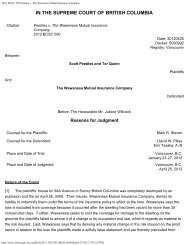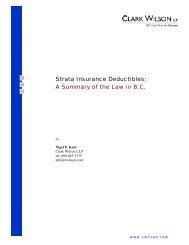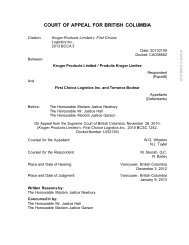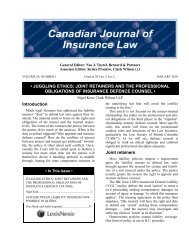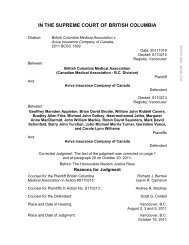AN OVERVIEW OF CONSTRUCTION CLAIMS: - Clark Wilson LLP
AN OVERVIEW OF CONSTRUCTION CLAIMS: - Clark Wilson LLP
AN OVERVIEW OF CONSTRUCTION CLAIMS: - Clark Wilson LLP
Create successful ePaper yourself
Turn your PDF publications into a flip-book with our unique Google optimized e-Paper software.
p. 4<br />
Consequently, float time allows a construction project to absorb some delays in the construction<br />
schedule. However, when the float is used up, the work at issue returns to the critical path, and<br />
the delay which was absorbed by the float may result in construction claims and the need for one<br />
party to compensate another for any resulting costs associated with the delay.<br />
A final consideration is that the amount of float to include in any construction schedule involves<br />
a costs/benefits analysis by the contractor. Including some float time is obviously a good idea,<br />
but including too much float increases the contract price. The contractor thus must do a<br />
balancing act between the competing interests in this regard.<br />
4. The Concept Of Acceleration<br />
Acceleration is an effect of delay. Acceleration occurs when 7 :<br />
(a)<br />
(b)<br />
A contractor must complete its work faster than it had originally planned in the<br />
construction schedule; or<br />
Despite excusable delay meriting an extension of time in the contract schedule,<br />
the owner requires the contractor to complete the construction as originally<br />
scheduled;<br />
• Here, an owner requires a contractor to complete the work as originally<br />
scheduled but the contractor has lost time in the schedule due to factors<br />
beyond its control. When a contractor is excusably delayed, it is entitled<br />
to a time extension. When an owner requires that the contract work be<br />
completed as per the contract completion date, then a contractor must<br />
accelerate its work to meet that demand.<br />
The first type of acceleration listed above is direct, while the second type is constructive.<br />
An owner’s denial of the valid time extensions to a contract may lead to claims for damages for<br />
breach of contract in an amount representing the additional costs to the contractor for having to<br />
do more work in the available time period. Such additional costs may result from the need to<br />
replay and re-sequence the work, hire additional workers, work overtime, accelerate material<br />
delivery, obtain additional supervision, or use additional equipment. A contractor should note<br />
that it may succeed at a claim for acceleration damages even if it did not achieve the requested<br />
completion date.<br />
Contractors should realize that acceleration may not be as obvious as expected. While a clear<br />
order from an owner to accelerate leaves little ambiguity, circumstances are often more obscure.<br />
Keep in mind that a threat to terminate a contract for default when a known excusable delay is<br />
present may be tantamount to acceleration, as is a request, as opposed to an order, to accelerate.<br />
Pressure may be adequate for an acceleration claim.<br />
7<br />
Construction Delay Claims, 3rd Ed., Barry B. Bramble and Michael T. Callahan, 2000, Aspen Law &<br />
Business, at p. 4-8s<br />
© 2005 <strong>Clark</strong> <strong>Wilson</strong> <strong>LLP</strong> www.cwilson.com<br />
Samantha Ip, T. 604.643.3172



